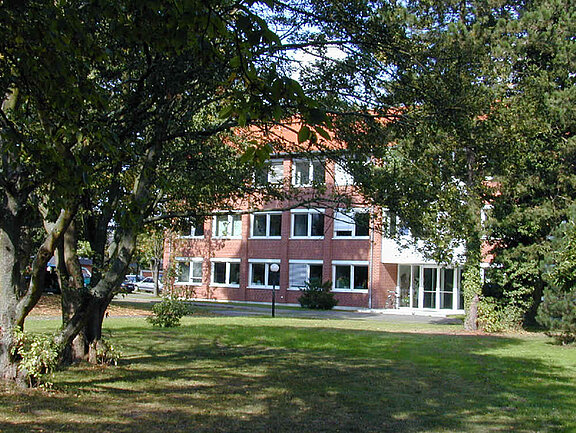In 1896, a remount service was established on the agricultural premises of the monastery Mariensee in Neustadt am Rübenberge, where young horses were prepared for military use. Research on animal breeding has been done there since 1946. The development of the research institute began with the lease of the monastery-owned farm with the purpose to continue the work of the Kaiser-Wilhelm-Institute for Research on Animal Breeding founded in 1939 in Dummerstorf near Rostock after the end of the Second World War. The institute in Dummerstorf became “Research Centre for Animal Production” of the Academy of Agricultural Sciences of the former GDR and was incorporated into the Scientific Association Gottfried Wilhelm Leibniz (WGL) after the German reunification.
At the foundation session of the Max Planck Society in February 1948, the Mariensee institute was designated “Max-Planck-Institute (MPI) for Animal Breeding and Animal Nutrition“. Almost simultaneously, the federal remount service in the neighbouring village Mecklenhorst and the Trenthorst and Wulmenau farms in Schleswig-Holstein were integrated into the institute. At that time, research was dominated by the improvement of the quantitative performance characteristics of farm animals as well as their nutrition to ensure the supply of the population with food of animal origin. The research results were also documented in a scientific series published by the MPI in Mariensee. Until the Max Planck Society gave up all research on agricultural issues, the Mariensee institute remained part of the Max Planck Society.
In 1974, the institute was incorporated into the Federal Agricultural Research Centre (FAL) with headquarters in Braunschweig-Völkenrode as “Institute for Animal Breeding and Animal Behaviour”. Since then, the institute has been part of the portfolio of the Federal Ministry of Food, Agriculture and Consumer Protection (BMELV). The basic tasks of all public research institutions of the BMELV are:
to establish the scientific basis of political decision-making of the BMELV
to entend scientific knowledge
The research spectrum of the Mariensee institute was broadened by the establishment of an endocrinological working group, and the departments for reproduction biology and for process and product quality were enlarged. Within the past few years, work in Mariensee has been concentrating on aspects of farm animal genetics in large and small animals.
With the reorganization of research within the portfolio of the BMELV and the liquiditation of the FAL, the Mariensee institute was incorporated into the Friedrich-Loeffler-Institut (FLI) as “Institute of Farm Animal Genetics”. In the near future, new buildings will be established to consolidate all three Lower Saxonian institutes of the FLI, including the institutes in Celle and Braunschweig, in Mariensee. Currently, the institute consists of three research departments, one working group as well as the research station and the administration.


